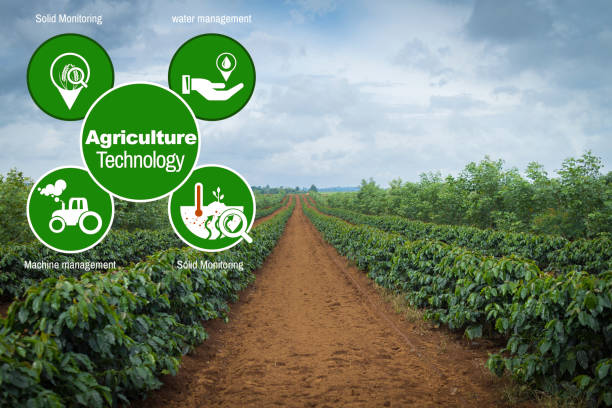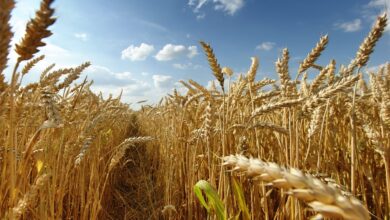Why Agribusiness Management is Critical for Sustainable Agriculture
AGRIBUSINESS MANAGEMENT

Agribusiness management is a critical factor in the success of sustainable agriculture. It involves the implementation of best practices in agricultural production, marketing, and supply chain management. It also involves the use of new technologies and innovative approaches to ensure that farms are efficient, profitable, and environmentally friendly. Agribusiness management can help farmers maximize their resources, reduce risk, and increase yields, ultimately resulting in more sustainable agriculture.
What is Agribusiness Management?
Agribusiness management is a field that encompasses the business aspects of agriculture. It involves the strategic planning, organizing, and controlling of agricultural operations to ensure efficiency, profitability, and sustainability. This management approach takes into account the entire agricultural supply chain, from production to distribution, marketing, and sales.
In simpler terms, agribusiness management involves applying business principles and practices to the unique challenges and opportunities of the agricultural sector. It requires a deep understanding of the agricultural industry, including factors such as crop selection, land management, machinery and equipment, labor, finance, and marketing.
Agribusiness management is essential for the success of sustainable agriculture. By effectively managing agricultural operations, farmers can optimize their use of resources, minimize waste, and reduce the environmental impact of their practices. This includes implementing best practices for soil and water conservation, integrated pest management, and efficient use of fertilizers and pesticides.
Furthermore, agribusiness management plays a crucial role in ensuring the economic viability of farming operations. By developing and implementing effective marketing strategies, farmers can secure competitive prices for their products, access new markets, and maximize their profits. Additionally, sound financial management practices can help farmers navigate risks and uncertainties, ensuring the long-term sustainability of their operations.

The Importance of Sustainable Agriculture
Sustainable agriculture is not just a buzzword; it is a necessity for the future of our planet. With a rapidly growing population and limited natural resources, we must find ways to feed ourselves without depleting the environment or compromising the ability of future generations to meet their own needs.
The importance of sustainable agriculture cannot be overstated. Firstly, it ensures that we can continue to produce food in the long term. By adopting practices that preserve soil fertility, conserve water, and minimize chemical inputs, sustainable agriculture safeguards the productivity of our land for future generations. It also protects biodiversity, ensuring the survival of plant and animal species essential for a healthy ecosystem.
Sustainable agriculture is also crucial for environmental protection. It helps mitigate climate change by reducing greenhouse gas emissions, promoting carbon sequestration in soils, and preserving forests. By avoiding the excessive use of pesticides and fertilizers, it minimizes water pollution and protects the quality of our water resources. It also reduces soil erosion and maintains the health of our ecosystems.
Moreover, sustainable agriculture has social and economic benefits. It promotes the well-being of farmers and rural communities by creating stable and fair employment opportunities. By supporting local agriculture, it reduces our dependence on imports and strengthens food security. It also encourages sustainable consumption patterns and promotes public health by providing access to nutritious and safe food.

How Agribusiness Management Can Contribute to Sustainability
Agribusiness management plays a crucial role in achieving sustainability in agriculture by implementing best practices, optimizing resources, and fostering innovation. By adopting sustainable agricultural practices, agribusiness managers can contribute to environmental preservation, economic viability, and social responsibility.
One way agribusiness management can contribute to sustainability is through the promotion of sustainable farming techniques. By encouraging farmers to use organic fertilizers, integrated pest management, and crop rotation, agribusiness managers can help minimize the use of harmful chemicals and reduce the impact on soil, water, and biodiversity. These practices not only benefit the environment but also lead to healthier and safer food for consumers.
Another way agribusiness management can contribute to sustainability is by improving the efficiency of resource use. By implementing precision farming techniques, such as the use of drones and satellite imagery, agribusiness managers can help farmers optimize the use of water, fertilizers, and energy. This reduces waste and lowers production costs while minimizing the environmental footprint of agricultural activities.
Additionally, agribusiness management can facilitate the adoption of innovative technologies that contribute to sustainability. For example, the use of precision agriculture tools, such as sensor technology and data analytics, can help farmers make data-driven decisions and optimize their farming practices. This not only improves productivity and profitability but also reduces resource consumption and environmental impact.

Examples of Successful Agribusiness Management Practices
Successful agribusiness management practices can vary depending on the specific needs and challenges of a farming operation. However, here are a few examples of practices that have been proven to be effective in promoting sustainability and profitability in agriculture.
- Crop diversification: By growing a variety of crops, farmers can reduce their reliance on a single crop and minimize the risk of crop failure. Diversification can also improve soil health and nutrient cycling, as different crops have different nutrient requirements.
- Integrated pest management (IPM): IPM is an approach that combines multiple pest control strategies, such as biological control, crop rotation, and targeted pesticide use. By minimizing the use of chemical pesticides and promoting natural pest control, farmers can protect crop yields while minimizing the impact on the environment.
- Precision agriculture: Precision agriculture involves the use of technology, such as GPS, sensors, and drones, to optimize the use of resources and improve crop management. By precisely applying water, fertilizers, and pesticides, farmers can reduce waste, increase yields, and minimize the environmental impact of their practices.
- Sustainable water management: Efficient irrigation systems, such as drip irrigation and sprinklers, can help farmers conserve water and reduce water wastage. Implementing water-saving techniques, such as mulching and using cover crops, can also help retain soil moisture and improve water infiltration.
- Responsible waste management: Proper disposal of agricultural waste, such as crop residues and manure, is crucial for preventing environmental pollution. Implementing composting or anaerobic digestion systems can turn waste into valuable resources, such as organic fertilizers and bio-gas.

Challenges in Agribusiness Management
Agribusiness management is a complex field that comes with its fair share of challenges. In order to effectively navigate these challenges, agribusiness managers must have a deep understanding of the agricultural industry, as well as the ability to adapt to the ever-changing dynamics of the sector. Here are some of the main challenges faced in agribusiness management:
- Market volatility: The agricultural industry is highly influenced by market fluctuations, which can impact the profitability of farming operations. Agribusiness managers must constantly stay informed about market trends, anticipate changes, and adjust their strategies accordingly.
- Climate change: Climate change is one of the biggest challenges facing the agricultural sector today. Rising temperatures, changing precipitation patterns, and extreme weather events can all have a significant impact on crop yields and farm profitability. Agribusiness managers need to be proactive in implementing climate-smart practices and technologies to mitigate the effects of climate change.
- Access to finance: Access to finance is a common challenge for farmers and agribusiness managers alike. Securing loans, managing cash flow, and finding investment opportunities can be difficult, especially for small-scale farmers. Agribusiness managers must have strong financial management skills and knowledge of funding options to help farmers overcome these challenges.
- Regulatory compliance: The agricultural industry is subject to a wide range of regulations and compliance requirements, from food safety standards to environmental regulations. Agribusiness managers must stay up-to-date with these regulations and ensure that farming operations are in compliance to avoid legal issues and penalties.
- Technology adoption: The rapid pace of technological advancements can be overwhelming for agribusiness managers. It can be challenging to keep up with the latest technologies and determine which ones are most suitable for a particular farming operation. Agribusiness managers must be willing to embrace and integrate new technologies into their operations to stay competitive.
- Labor management: The availability of skilled labor in the agricultural industry can be a challenge, especially in rural areas. Agribusiness managers must have effective labor management strategies in place to attract and retain skilled workers, as well as to ensure a safe and productive working environment.

Skills Required for Successful Agribusiness Management
To excel in agribusiness management, there are certain skills and attributes that are essential for success. While the specific requirements may vary depending on the specific role and organization, here are some of the key skills required for successful agribusiness management:
- Business acumen: Agribusiness management involves the application of business principles and practices to the agricultural sector. This requires a strong understanding of finance, marketing, strategic planning, and decision-making. It is crucial to have a solid foundation in business concepts to effectively manage the financial and operational aspects of a farming operation.
- Agricultural knowledge: A deep understanding of the agricultural industry is essential for effective agribusiness management. This includes knowledge of crop production, soil and water management, animal husbandry, and agricultural technologies. Familiarity with agricultural trends, regulations, and best practices is also important to stay up-to-date and make informed decisions.
- Problem-solving skills: Agribusiness managers face a wide range of challenges, from market volatility to climate change impacts. The ability to analyze problems, identify solutions, and make decisions under pressure is crucial. Problem-solving skills help agribusiness managers navigate uncertainties and find innovative ways to overcome challenges.
- Communication and interpersonal skills: Effective communication is essential for successful agribusiness management. Agribusiness managers need to interact with various stakeholders, including farmers, suppliers, customers, and regulatory authorities. Strong communication skills help build relationships, negotiate contracts, and resolve conflicts.
- Leadership abilities: Agribusiness managers often need to lead teams and coordinate multiple activities. Leadership skills, such as the ability to motivate, delegate, and inspire others, are important for driving productivity and achieving goals. Strong leadership abilities help agribusiness managers navigate complexities and foster collaboration.
- Analytical skills: Agribusiness management involves analyzing large amounts of data and making data-driven decisions. Strong analytical skills help agribusiness managers identify patterns, trends, and opportunities. These skills enable managers to optimize resource allocation, develop effective marketing strategies, and improve overall performance.

Career Opportunities in Agribusiness Management
As the importance of sustainable agriculture continues to grow, so does the demand for professionals in the field of agribusiness management. If you have a passion for agriculture and a keen business sense, a career in agribusiness management could be the perfect fit for you.
There are a wide range of career opportunities available in agribusiness management, spanning across different sectors of the agricultural industry. One option is to work directly with farmers and agricultural producers, helping them optimize their operations and make informed business decisions. This could involve roles such as farm manager, agricultural consultant, or agricultural economist. These positions require a strong understanding of the agricultural industry, as well as business and management skills.
Another option is to work in the agribusiness industry, which includes companies involved in the production, processing, and distribution of agricultural products. This could involve roles such as supply chain manager, marketing manager, or sales representative. In these positions, you would be responsible for ensuring the smooth flow of products from farm to market, developing marketing strategies, and building relationships with customers and suppliers.

Additionally, there are opportunities to work in research and development, where you can contribute to the advancement of sustainable agricultural practices. This could involve roles such as agricultural researcher, bio technologist, or agronomist. In these positions, you would be involved in developing new technologies, conducting experiments, and finding innovative solutions to improve agricultural productivity and sustainability.
Furthermore, there are opportunities to work in government and non-profit organizations, where you can contribute to the development and implementation of policies and programs that promote sustainable agriculture. This could involve roles such as agricultural policy analyst, program coordinator, or sustainable agriculture advocate. In these positions, you would be involved in shaping agricultural policies, advocating for sustainable practices, and supporting farmers and rural communities.




New tech could give Chatgpt a run for its money. It turns your Youtube videos into video games..keeps people engaged to watch every second. You can even reward them for watching the whole video and they give you their email to get the reward 😉 As seen on CBS, NBC, FOX, and ABC.
Send me an email or skype message below to see if you qualify for a free GAMIFICATION of your video.
Mike
email: gamifyvideo@gmail.com
skype: live:.cid.d347be37995c0a8d